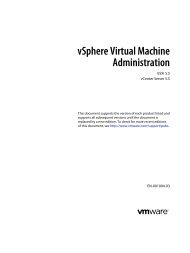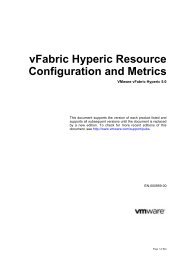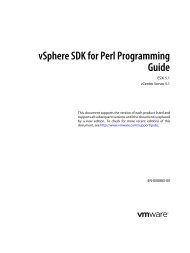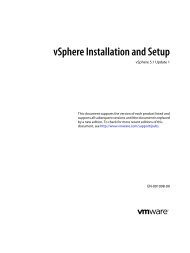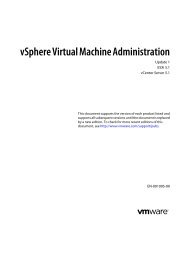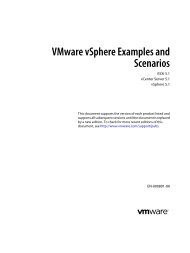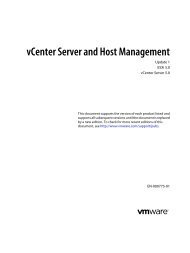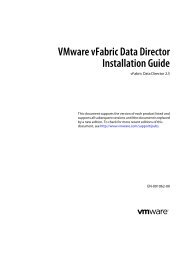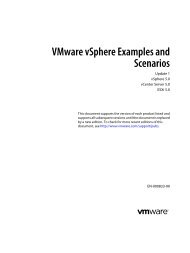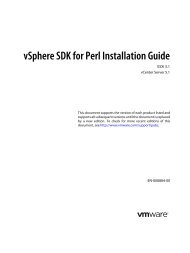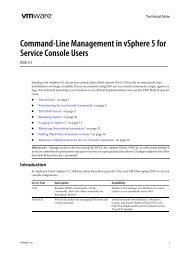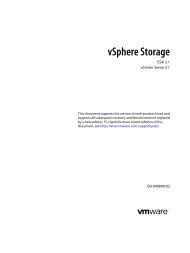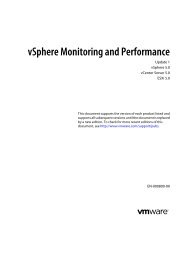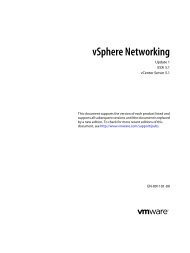Virtual Disk API Programming Guide - Documentation - VMware
Virtual Disk API Programming Guide - Documentation - VMware
Virtual Disk API Programming Guide - Documentation - VMware
Create successful ePaper yourself
Turn your PDF publications into a flip-book with our unique Google optimized e-Paper software.
<strong>Virtual</strong> <strong>Disk</strong> <strong>Programming</strong> <strong>Guide</strong><br />
Reading and Writing Remote <strong>Disk</strong><br />
The DoEdit() function is similar for remote managed virtual disk on ESX/ESXi hosts, but beforehand you<br />
must call Vix<strong>Disk</strong>Lib_Connect() with authentication credentials instead of passing NULL parameters.<br />
if (appGlobals.isRemote) {<br />
cnxParams.vmxSpec = NULL;<br />
cnxParams.serverName = appGlobals.host;<br />
cnxParams.credType = VIXDISKLIB_CRED_UID;<br />
cnxParams.creds.uid.userName = appGlobals.userName;<br />
cnxParams.creds.uid.password = appGlobals.password;<br />
cnxParams.port = appGlobals.port;<br />
}<br />
VixError vixError = Vix<strong>Disk</strong>Lib_Init(1, 0, NULL, NULL, NULL, NULL);<br />
CHECK_AND_THROW(vixError);<br />
vixError = Vix<strong>Disk</strong>Lib_Connect(&cnxParams, &appGlobals.connection);<br />
Deleting a <strong>Disk</strong> (Unlink)<br />
The function to delete virtual disk files is Vix<strong>Disk</strong>Lib_Unlink(). It takes two arguments: a connection and a<br />
VMDK filename.<br />
vixError = Vix<strong>Disk</strong>Lib_Unlink(appGlobals.connection, appGlobals.diskPath);<br />
Effects of Deleting a <strong>Virtual</strong> <strong>Disk</strong><br />
When you delete a VMDK, you lose all the information it contained. In most cases, the host operating system<br />
prevents you from doing this when a virtual machine is running. However, if you delete a VMDK with its<br />
virtual machine powered off, that guest OS becomes unbootable.<br />
Renaming a <strong>Disk</strong><br />
The function to rename virtual disk files is Vix<strong>Disk</strong>Lib_Rename(). It takes two arguments: the old and the<br />
new VMDK filenames.<br />
vixError = Vix<strong>Disk</strong>Lib_Rename(oldGlobals.diskpath, newGlobals.diskpath);<br />
Effects of Renaming a <strong>Virtual</strong> <strong>Disk</strong><br />
The server expects VMDK files of its guest OS virtual machines to be in a predictable location. Any file accesses<br />
that occur during renaming might cause I/O failure and possibly cause a guest OS to fail.<br />
Working with <strong>Disk</strong> Metadata<br />
With VMFS on ESX/ESXi hosts, disk metadata items could be important because they store information about<br />
the disk mapping and interactions with the containing file system.<br />
Managing Child <strong>Disk</strong>s<br />
In the <strong>Virtual</strong> <strong>Disk</strong> <strong>API</strong>, redo logs are managed as a parent‐child disk chain, each child being the redo log of<br />
disk changes made since its inception. Trying to write on the parent after creating a child results in an error.<br />
The library expects you to write on the child instead. See Figure 4‐2, “Child <strong>Disk</strong>s Created from Parent,” on<br />
page 33 for a diagram.<br />
Creating Redo Logs<br />
A redo log is created by taking a virtual machine snapshot, which contains both disk data and virtual machine<br />
state. On hosted disk only, Vix<strong>Disk</strong>Lib_CreateChild() creates a redo log without virtual machine state.<br />
You could write a simple application to create redo logs, or snapshots on managed disk, at 3:00 AM nightly.<br />
(although multiple snapshots have a performance impact). When you create a redo log while the virtual<br />
machine is running, the <strong>VMware</strong> host re‐arranges file pointers so the primary VMDK, .vmdk for<br />
example, keeps track of redo logs in the disk chain. Use the disk chain to re‐create data for any given day.<br />
52 <strong>VMware</strong>, Inc.



